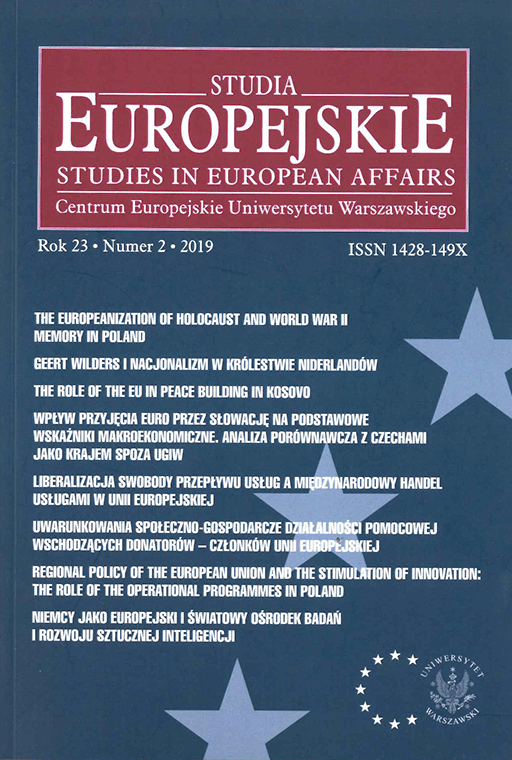
ISSUE: 2/2019
- Volume 23
- Number 2
- 2019
Subscribe NEWSLETTER
Studia Europejskie –
Studies in European Affairs
ISSN: 1428-149X
e-ISSN: 2719-3780
License
Articles published in the journal are under a Creative Commons Attribution – Non Commercial – No Derivatives 4.0 International License
The Europeanization of Holocaust and World War II Memory in Poland – General Remarks
Abstract
The article presents a summary of the reflections and research of the author (and the wider research team) on the Europeanization of heritage and memory in Holocaust and World War II museums, exhibitions and educational projects in Poland and gives a theoretical overview on the issue. In how far does the Polish way of commemoration refl ect the postulates of academic research in this fi eld? Currently in Europe, the trend in historical museums shifts from the sheer presentation of the past towardsb a more open format, including references to human rights, tolerance and non-discrimination. Furthermore, European museology develops towards being a platform of democratic discussion and the negotiation of meanings. What can be the potential role of Polish Holocaust and World War II museums? And how are these postulates in practice realized in cultural institutions and museums dealing with one of the greatest disasters in modern history? The research sample included the Auschwitz-Birkenau State Museum, the State Museum at Majdanek, the Home Army Museum in Kraków, the Ulma Family Museum of Poles Saving Jews in World War II in Markowa and a number of other institutions in Poland.
References
Annual Museum Report of the State Museum Auschwitz-Birkenau for 2015, www.auschwitz.org.
Annual Museum Report of the State Museum Auschwitz-Birkenau for 2017, www.auschwitz.org.
Assmann A., Europe: A Community of Memory? Twentieth Annual Lecture of the GHI, November 16, 2006, “GHI Bulletin”, no. 40/Spring 2007.
Büttner E., Europeanization at the Memorial Sites of Former Nazi Concentration Camps in Poland. The Cases of Auschwitz, Majdanek and Kulmhof, in: The Europeanization of Heritage and Memories in Poland and Sweden, eds. K. Kowalski, B. Törnquist-Plewa, Jagiellonian University Press, Kraków 2016.
Büttner E., Suszkiewicz K., Remembrance Days in European Union – between Oblivion, National Manifestation and an European Narrative?, “Studia Żydowskie Almanach”, no. 6/2017.
Davies N., Heart of Europe. The Past in Poland’s present, Oxford University Press, New York 2001.
Diner D., Gegenläufige Gedächtnisse. Über Geltung und Wirkung des Holocaust, Vandenhoeck & Ruprecht, Göttingen 2007.
Gross J.T., Neighbours. The Destruction of the Jewish Community in Jedwabne, Poland, Princeton, New York 2001.
Karski. Nie dać światu zapomnieć, Exhibition catalogue, Łódź 2014.
Karlsson K.G., The Holocaust as a Problem of Historical Culture, in: Echoes of the Holocaust. Historical Cultures in Contemporary Europe, eds. K.G. Karlsson, U. Zander, Nordic Academic Press, Lund 2003.
Kowalski K., Toernquist-Plewa B., Heritage and Memory in a Changing Europe. Introductory Remarks, in: The Europeanization of Heritage and Memories in Poland and Sweden, eds. K. Kowalski, B. Törnquist-Plewa, Jagiellonian University Press, Kraków 2016.
Kranz T., Muzea martyrologiczne jako przestrzenie pamięci i edukacji, in: Obóz- -muzeum. Trauma we współczesnym wystawiennictwie, eds. M. Fabisiak, M. Owsiński, Universitas Kraków 2013.
Kranz T., Krajobrazy pamięci – podmioty kultury – obiekty turystyczne – przestrzenie edukacji. O współczesnych znaczeniach muzeów w poobozowych miejscach pamięci, in: Muzea w poobozowych miejscach pamięci. Tożsamość, znaczenia, funkcje, ed. T. Kranz, Państwowe Muzeum na Majdanku, Lublin 2017.
Leggewie C., Seven Circles of European Memory, “Eurozine” 2010, DOI: https://doi.org/10.1007/978-90-481-8945-8_8.
Leggewie C., Der Kampf um die europäische Erinnerung. Ein Schlachtfeld wird besichtigt, C.H. Beck, München, 2011, DOI: https://doi. org/10.17104/9783406619960.
Mach Z., Democratization and the Struggle for the Recognition of Memory and Heritage in the European Frame of Reference, in: The Europeanization of Heritage and Memories in Poland and Sweden, eds. K. Kowalski, B. Törnquist-Plewa, Jagiellonian University Press, Kraków 2016.
Mach Z., Some Remarks on Memory and Heritage in Europe, “Politeja”, no. 1(52)/2018, DOI: https://doi.org/10.12797/Politeja.15.2018.52.09.
McCall V., Gray C., Museums and the ‘new museology’: theory, practice and organisational change, “Museum Management and Curatorship”, no. 1, vol. 29/2013, DOI: https://doi.org/10.1080/09647775.2013.869852.
Obóz-Muzeum. Trauma we współczesnym wystawiennictwie, eds. M. Fabiszak, M. Owsiński, Universitas, Kraków 2013.
Piekarska-Duraj Ł., Democratization as an Aspect of Heritage Europeanization. The Museum Triangle, in: The Europeanization of Heritage and Memories in Poland and Sweden, eds. K. Kowalski, B.
Törnquist-Plewa, Jagiellonian University Press, Kraków 2016. Piekarska-Duraj Ł., Törnquist-Plewa B., Europeanization in Regional Museums? Examples from Sweden and Poland, “Politeja”, no. 52 (1)/2018, DOI: https://doi.org/10.12797/Politeja.15.2018.52.03.
Sierp A., History, Memory, and Trans-European Identity. Unifying Divisions, New York–London 2014, DOI: https://doi.org/10.4324/9781315766973.
Suszkiewicz K., The Rise of the Righteous Among the Nations as a New Model for the Polish Hero, in: The Europeanization of Heritage and Memories in Poland and Sweden, eds. K. Kowalski, B. Törnquist-Plewa, Kraków 2016.
Törnquist-Plewa B., The Jedwabne Killings – A Challenge for Polish Collective Memory, in: Echoes of the Holocaust. Historical Cultures in Contemporary Europe, eds. K.-G. Karlsson, U. Zander, Nordic Academic Press, Lund 2003.
Wassermann E., The Polish Discourse about the Righteous among the Nations. Between Commemoration, Education and Justifi cation? “Politeja” 1(52)/2018, DOI: https://doi.org/10.12797/Politeja.15.2018.52.06.
Wassermann E., Us and Them. The Other in the Home Army Museum in Kraków, in: Narrating Otherness in Poland and Sweden. European Heritage as a Discourse of Inclusion and Exclusion, eds. K. Kowalski, Ł. Piekarska- -Duraj, B. Törnquist-Plewa, Peter Lang, New York–Oxford–Warszawa– Wien 2019.
Ziębińska-Witek A., Miejsca Zagłady jako przestrzenie ekspozycyjne, in: Muzea w poobozowych miejscach pamięci. Tożsamość, znaczenia, funkcje, ed. T. Kranz, Państwowe Muzeum na Majdanku, Lublin 2017.
DOI: 10.33067/SE.2.2019.1
Language: English
Pages: 9-25
How to Cite:
Harvard
Wassermann, E. (2019) "The Europeanization of Holocaust and World War II Memory in Poland – General Remarks". Studia Europejskie – Studies in European Affairs, 2/2019, pp. 9-25. DOI: 10.33067/SE.2.2019.1